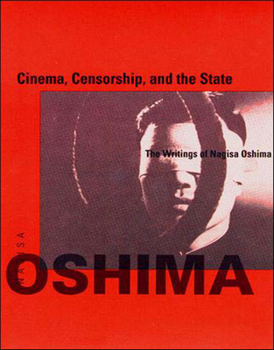Cinema, Censorship, and the State: The Writings of Nagisa Oshima, 1956-1978
(Part of the October Books Series)
Select Format
Select Condition 
Book Overview
The more than 40 writings that make up this intellectual autobiography reveal a rare conjunction of personal candor and political commitment. Nagisa Oshima is generally regarded as the most important Japanese film. director after Kurosawa and is one of Japan's most productive and celebrated postwar artists. His early films represent the Japanese New Wave at its zenith, and the films he has made since (including In the Realm of the Senses and Merry Christmas, Mr. Lawrence) have won international acclaim. The more than 40 writings that make up this intellectual autobiography reveal a rare conjunction of personal candor and political commitment. Entertaining, concise, disarmingingly insightful, they trace in vivid and carefully articulated detail the development of Oshima's theory and practice.The writings are arranged in chronological order and cover the period from the mid-1950s to the mid-1980s. Following a historical overview of the contemporary Japanese cinema, a substantial section articulates the theoretical and political rationale of 0shima's film production. Among many other topics considered in his essays, Oshima questions the economics of film production, the ethics of the documentary film, censorship (both political and sexual), and the relation of aesthetics and social taboos.
Format:Paperback
Language:English
ISBN:0262650398
ISBN13:9780262650397
Release Date:August 1993
Publisher:MIT Press
Length:320 Pages
Weight:1.32 lbs.
Dimensions:0.7" x 6.9" x 9.0"
Age Range:18 years and up
Grade Range:Postsecondary and higher
Related Subjects
Arts, Music & Photography Censorship Performing Arts Photography Politics & GovernmentCustomer Reviews
1 rating
Vital writings on cinema...
Published by Thriftbooks.com User , 18 years ago
Oshima on Oshima - the bulk of this extremely intriguing collection of translated essays details his 60s heyday, with 1976 as the rough cutoff point. The essays detailing years before the start of his film career are the most intriguing - childhood, grade school and university - as Oshima devotes considerable detail to intellectual influences that drifted into his life beginning at a very early age; this writing recontextualizes quite a bit of his cinematic output, which seems far more organic now than it would first appear to be. Writings touching upon his entry into the film industry are similarly insightful; throughout Oshima does less political theorizing than the title would imply, instead gravitating towards material that provides additional personal and historical context for his startling and intuitive films. Oshima held a fascination with 'outsiders' of all varieties - in the hands of many filmmakers this is either a camp affectation, or a stylistic and symbolic one, but the writing here pulls another theme from Oshima's body of work - strong interests in human rights, the persistence of discrimination and arbitrary social hierarchies in seemingly developed societies, oppression and personal liberty, and these interrelated themes are very consistent through several films, all made during the 1960s. His writing here detailing trips to South Korea makes these concerns more explicit, and after a read through these pages, certain films - 'Death By Hanging' in particular - seem less like new wave stuntmaking, and more like some of the more urgent protest missives to emerge from the 1960s. I would have liked to see a bit more detailing of the technical process behind certain films - the frenetic creation of 'Death By Hanging' is discussed at some length, which is very welcome. But it is clear from viewing several of his provocative and very tightly-constructed late 60s films that Oshima is one of the more formidable film theorists to emerge during or since the 1960s - making use of bold stylistic experimentalism ("Diary Of A Shinjuku Thief"), reality-based psychological dramas ("Boy" and "Ceremony"), or an overlapping mix of both ("In The Realm Of The Senses" and "Death By Hanging"). Thus a bit more technical discussion of his varied structural ideas and theories would have been a nice addition here. But this remains a vital bit of film writing from one of the more genuinely iconoclastic filmmakers out there. -David Alston






